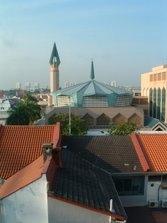
JAN 21 — It was a good day for Singapore when thousands of guests flocked to the Lion City on Jan 20. On the contrary, no one came to Johor Bahru, or even the whole of Malaysia.
When the United States issued a travel warning about possible terror threats in Sabah, Resorts World Sentosa, Singapore’s first casino-resort, opened four hotels at 8.18am and the over 5,000 rooms were fully booked on the first night. Its prosperity was conceivable.
After the opening of the casino and the Universal Studios theme park, Singapore is expected to attract 13 million tourists annually. In addition to Resorts World Sentosa, The Marina Bay Sands, built by Las Vegas Sands, will also be opened in April this year. After the opening of the two integrated resorts, Singapore may achieve the goal of attracting 17 million of tourists yearly in 2015.
When they have their own casinos, will Singaporean gamblers still travel along the way to Genting Highlands? Tourists from China are very likely to shift their targets, too. I’m afraid that businesses in Johor Bahru would as well be affected.
What countermeasures will Malaysia take to meet Singapore’s measures to attract tourists? Other than the theme parks, including Legoland Malaysia, in the Iskandar Special Economic Zone, Malaysia does not seem to have other new tourist attractions. Legoland is scheduled to be completed and opened to the public in April 2012 while the indoor theme park will be opened in 2013.
The Tourism Ministry should introduce new tourism packages in this two-year time before the theme parks are opened to the public to attract foreign tourists to come over on their way to Singapore’s casinos and theme parks.
The competition in the tourism industry will become more intense in the future. For example, South Korea recently announced to spend about US$3 billion (RM10.2 billion) to build the largest theme park in Asia, which covers 435 hectares. In addition to a Universal Studios theme park, there will be a water park, golf courses and resorts. It is expected to be opened in 2014 and it targets rich tourists from China. The government should wake up now as it can no longer indulge in last year’s statistics, which indicated a 7.6 per cent increase of tourist arrivals.
From Singapore’s tourism strategy, we can see the determination and vision of the Singapore government to actively revive and diversify its economy, as well as to look for new growth areas. We cannot help but worry over the Malaysian economy that has turned into dead waters.
After it separated from Malaysia, Singapore developed into a port and subsequently, it developed its financial and services industries, pharmaceutical industry, casinos and integrated resorts. This has fully reflected its pragmatism and flexibility. Malaysia is lagging far behind.
Since independence, Malaysia has always been relying on petroleum and palm oil. It does not succeed in developing multimedia information technology while its services industry is not open enough. It loses talents and fails to attract more foreign investors. When would the economy be transformed?
Today, Genting Bhd has transferred its capital and talents to Singapore and at the same time, it aims for investment opportunities in the United States. But Malaysian politicians are still quarreling over the issue of selling sand to Singapore. Why can’t they sit down and study how should they face the challenges from Singapore?
The outside world has been rapidly changing but we are still fighting over the “Allah” controversy. If our mindset remains unchanged, there will be no transformation for the country, the government, as well as the economy.
Source

No comments:
Post a Comment